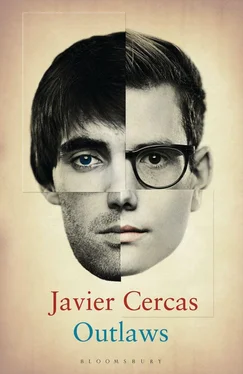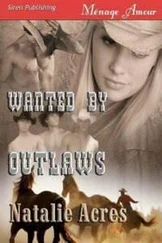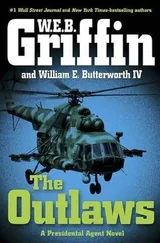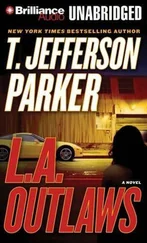‘I kept looking at her. I pretended to look at the pinball table, but I was looking at her. Tere noticed. The proof was that she hadn’t even finished playing that ball when she said: Not bad-looking, am I, Gafitas? I blushed; I immediately regretted having blushed. The arcade was very noisy, but I had the impression that in the centre of the uproar was an absolute silence, which only I could hear. I pretended I hadn’t really heard her question. Tere didn’t repeat it; she finished playing the ball unhurriedly and, leaving the game half-finished, took me by the hand and said: C’mon.
‘Have I already told you that some of the things that happened that summer feel like things I’ve dreamt rather than things I’ve experienced? What happened next was one of those. Tere dragged me to the back of the arcade, dodging the people that were beginning to fill the place, and without letting go of my hand we went into the women’s washroom. It was exactly the same as the men’s — there was a long hallway with a big mirror on the wall, opposite the line of stalls — and at that moment it was almost empty: just a couple of girls in high heels and miniskirts applying mascara in front of the mirror. When Tere and I came in, the girls looked at us, but didn’t say anything. Tere opened the door of the first stall and invited me in. Where are we going? I asked. In here, she answered. Disconcerted, I looked at the two girls, who were still looking at us. What? Tere hissed at them. Take a picture; it’ll last longer.
‘Startled, the girls turned back to the mirror. Tere pushed me into the stall, stepped in behind me, closed the door and bolted it. The stall was a minuscule space where only a toilet and tank fit; the floor was cement and the walls wood and they didn’t reach all the way to the floor. I leaned back against one of them; Tere pushed her handbag around to her back and gave me an order: Drop your trousers. What? I asked. Tere’s reply was to kiss me on the mouth: a long, dense, wet kiss, with her tongue twirling around mine. It was the first time in my life that a woman had kissed me. Drop your trousers, she repeated. Like a sleepwalker I unbuckled my belt and undid my zipper. Pants too, said Tere. I obeyed. When I finished, Tere took me in her hand. And now pay attention, Gafitas, she said. Then she crouched down, put it in her mouth and started to suck. It was all over very quickly, because, although I tried not to, I came almost immediately. Tere stood up and kissed me on the lips; now her mouth tasted of semen. Did you like that? she asked, still holding my exhausted dick in her hand. I managed to mumble something. Then Tere smiled fleetingly but perfectly, let go of me and, before walking out of the stall, said: Tomorrow I’ll be expecting you at La Font.
‘I don’t know how long I stayed there with my pants round my ankles, trying to recover from the shock, or how long it took me to get dressed again. But when I came out of the stall the washroom was empty. And when I came out of the washroom, Tere was not in the arcade; Zarco wasn’t there either, Gordo and Tío had come back in. I went to the door, leaned outside and looked up and down the street, but I didn’t see anybody. Señor Tomàs appeared beside me. Where did you get to? he asked. I looked at him: he had his hands in his pockets, and he hadn’t noticed that the pressure of his gut had popped two buttons of his shirt; a clump of curly, grey hair poked through the opening. Before I could answer he asked another question: Hey, kid, are you all right? You don’t look so good. I told him I was fine but that I’d just thrown up in the washroom, though I felt better now, and that maybe I wasn’t entirely recovered. Well, you take care, kid, Señor Tomàs warned me. You don’t want a relapse. Then he asked me what I’d been talking about with Zarco and Tere and the others and I told him that time we hadn’t talked about anything. Señor Tomàs clicked his tongue. I don’t trust those quinquis one bit, he said. Then he said: Don’t take your eyes off them if they come back, OK? I said OK and, looking at the double row of cars parked under the train overpass, for a moment I thought I’d never see Tere again and asked: Do you think they’ll be back? I don’t know, answered Señor Tomàs; and as we walked back to his booth added: With those people you never know.
‘The next day I went to La Font.’
‘Yes: I’m a police officer. Why did I join the police? I don’t know. I’m sure my father being a Civil Guard had something to do with it, though. And besides, I imagine at the time I was as idealistic and fond of novelty as any other kid my age; you know what I mean: in the movies the cop was the good guy who saved the good people from the bad guys, and that’s what I wanted to be.
‘The fact is that at the age of sixteen I prepared for the exam to become an inspector of the General Police Corps, the secret police. I was a terrible student, but for nine months I studied like crazy and at the end of that time I sat the exam and passed it and even got a good grade. How do you like that? To do my practical training I had to move from Cáceres to Madrid; I took a room in a house on Jacometrezo from which I came and went daily to the Police Academy, at number five Miguel Ángel Street. At that time I began to realize what this job actually entailed. And you know what? I wasn’t disappointed; well, some things did disappoint me — you know, the obligatory routines, stupid colleagues, oceans of red tape, things like that — but on the other hand I made a discovery that should have surprised me a lot and didn’t surprise me at all, and it was that being a police officer was exactly like I’d always thought it was going to be. I already told you I was an idealist, and such a stubborn idealist that for a long time I believed my job was the best job in the world; now that I’ve spent almost forty years doing it I know it’s the worst, apart from all the rest of them.
‘What were we talking about? Oh, yes. My practical training. I found Madrid a bit intimidating, in part because I’d always lived in a small city and in part because it was a difficult time and the veterans of the force with whom I patrolled the city and I were always coming across altercations in the streets: one day it was an illegal demonstration, the next it would be a terrorist attack, and then another day a bank robbery. Or whatever. The thing is I knew almost immediately that level of commotion was too much for me and that neither Madrid nor any other big city was right for me at the time.
‘That is one of the reasons behind the decision I took when I finished my practical training: requesting a position here, in Gerona. I both did and didn’t want to go back to Cáceres. I liked the city, but I didn’t like the idea of going back to live there again one bit, and much less with my parents. And then I thought Gerona could be a good solution to that wanting and not wanting, because it wasn’t Cáceres but it was very similar — both were tranquil, historic provincial capitals, with a large old quarter and all that — and I thought that would make me not feel such a stranger in Gerona; I must have also thought I could get a head start there before going home or choosing a better posting, doing easier and less demanding work than I would have had to do in a big city. Besides (this might seem stupid to you but it was very important), I don’t know why but I was very curious about the Catalan people, especially the people of Gerona. I’m lying, I do know: I was curious because during my practical training I read Gerona , the novel by Galdós. Do you know it? It’s a portrait of the city during the siege by Napoleon’s troops. When I read it, forty years ago, I loved it; it was damn good: the total tragedy of war, the greatness of a whole city up in arms and defended by an iron-willed people, the heroism of General Álvarez de Castro, a character of mythic stature who refused to surrender the ruined and starving city to the French, and whom Galdós portrayed as the greatest patriot of his age. In 1974 I was only nineteen years old and things like that made an impression on me, so I thought Gerona would be the ideal place to start.
Читать дальше












